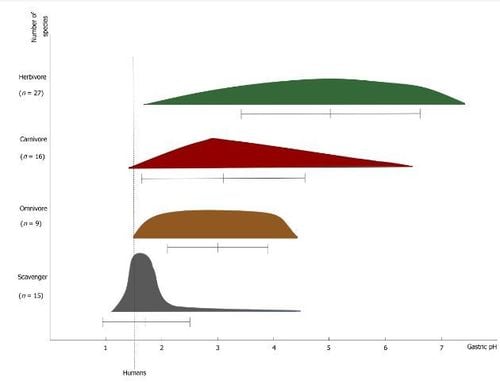This is an automatically translated article.
Post by Master, Doctor Mai Vien Phuong - Gastrointestinal endoscopy - Department of Medical Examination & Internal Medicine - Vinmec Central Park International General Hospital.Stomach acid is an element in the stomach of every person, secreted by the gastric mucosa. They play an important role in the body's digestion and metabolism of food. Accordingly, the increased concentration of stomach acid is a threat to human health, signaling the risk of some dangerous diseases. Therefore, it is very important to reduce and balance the amount of acid in the stomach.
1. The pH level of stomach acid is much lower in humans than in most animals
Proton pump inhibitors strongly inhibit stomach acid production, but digestive problems usually do not arise. We can eat almost normal food even after a total gastrectomy. The small intestine itself can digest and absorb food using various digestive enzymes without digestion in the stomach.
The pH level of stomach acid in humans is much lower than in most animals and is very close to the pH level of a scavenger known as a scavenger. It is thought that ancient humans were born with two legs about 4 million years ago. It is difficult for humans, who are just beginning to have unstable bipedal locomotion, to catch quadrupeds that can move faster without special hunting tools. They may have eaten animal remains, mainly the leftovers of carnivores, as food of animal origin.
2. The benefit to produce a quantity of gastric acid for humans is very important
The benefit to producing a quantity of gastric acid for humans is to eat meat, in which sterilization with gastric acid is very important. Humans produce a high concentration of gastric acid to be able to consume a diet containing certain bacteria and support this lifestyle by consuming considerable energy to protect themselves from gastric acid. Now, the chance for strong harmful bacteria to enter the digestive tract is reduced because the clean environment is organized.
If this hygienic environment is maintained for a long time, the acidity of our stomach must gradually decrease. Humans produce a high concentration of gastric acid to be able to consume a diet containing certain bacteria and support this lifestyle by consuming considerable energy to protect themselves from gastric acid. Now, the chance for strong harmful bacteria to enter the digestive tract is reduced because the clean environment is organized.
3. Anti-acid drugs are commonly used to treat diseases of the esophagus and stomach
In recent years, the number of patients with GERD has been increasing due to the prolongation of life and satiety with food and proton pump inhibitors (PPIs), potent acid reducers, are increasingly being used. prescription. People are concerned about the side effects of PPIs related to the increased number of prescriptions. However, it is generally understood that PPIs are relatively safe; PPIs strongly inhibit gastric acid production, but digestive problems usually do not arise, with some impaired absorption of vitamin B12.

4. Acidity in the human stomach
Digestion with gastric acid and pepsin is very strong and can completely break down food of animal origin. However, decomposition takes time. For example, a snake swallows an animal whole and digests it at a level of stomach acid (pH 1.5-2.0), similar to that in humans, but takes about a week for digestion, depending on the on the size of the animal swallowed. Modern humans keep food in the stomach for about 4 hours and there is a limitation to the stomach's digestibility. Less than cooked food that could have been served by the ancients would have taken more than four hours to digest in the stomach. Of course, the digestion time in the stomach in ancient times may have been longer than it is today, but the vigorous digestibility of the small intestine in modern humans is not necessary if digestion in the stomach is full. enough.5. We can eat almost normal food even after total gastrectomy
We can eat almost normal food even after a total gastrectomy, although we need to eat small amounts because the stomach cannot hold food. We can do so because the small intestine can digest and absorb food using various digestive enzymes without digestion in the stomach. Although impaired absorption of vitamins and minerals occurs because of the human's developed absorption system, the small intestine is still able to digest food. The authors captured how solid food is digested in the small intestine using capsule endoscopy and discovered that not only carbohydrates and meat but also the cytoplasm of plants are absorbed in the small intestine. In other words, the authors confirmed endoscopically that the passage of formed food through the stomach does not affect digestion in the small intestine. Because a patient taking PPIs did not have any major digestive/absorption problems, the importance of gastric acid in the human digestive system is thought to be low. However, the acid level in the human stomach is significantly higher than in many other animals.
6. pH of gastric acid in humans
The pH of gastric acid in humans is 1.5-2.0. According to a report reviewed by Beasley et al., the pH level is much lower than that of most animals, including anthropoids (≥ 3.0), and very close to the pH level of scavenger animals. called scavengers, such as falconine birds and vultures. This report shows a tendency for gastric pH to be highest in herbivores and decrease in the order of carnivores, omnivores and scavengers. Human pH is lower than in omnivores and equal to scavengers. Herbivores that eat live plants are protected by sunlight and plant-made antimicrobials, so there are fewer toxic bacteria. In addition, carnivores that normally eat non-fussed meat are freshly killed. The remains of such carnivores are free of highly virulent small bacteria and scavenging requires a system to disinfect the bacteria. It is thought that one of the disinfecting systems is the strong acid in the stomach. Living organisms use large amounts of energy to produce gastric acid. First, they need energy to produce gastric acid on their own.
In addition, they need to protect the gastric mucosa from gastric acid, prevent acid reflux at the esophageal junction, and neutralize gastric acid at the duodenal bulb for protection. The benefit of gastric acid production efforts to humans is a dietary fiber intake, in which gastric acid disinfection is very important.

Forty-two species of mammals and 25 species of avian excluding humans synthesized by Beasley et al. are classified as herbivores, carnivores, omnivores and scavengers and the distribution of species against pH in the stomach are shown in a diagram.
7. Humans may have survived and thrived as an animal that ate other animals
It is thought that ancient humans were born with two legs about 4 million years ago. It is difficult for humans, who are just starting out with unstable bipedal locomotion without special hunting tools, to catch quadrupeds that can move faster. They may have eaten animal remains, mainly the leftovers of carnivores (bone marrow), as food of animal origin. This hypothesis has been proven from bone marrow stone artifacts. In other words, man could have survived and evolved as an animal that ate other animals.
To implement this method of survival, humans needed increased bactericidal power, and individuals applied increased levels of stomach acid, which is preserved in modern humans. This high level of stomach acid allows relatively long-term use of foods of animal origin, which are difficult to store, and can support many dietary habits of humans who are omnivores.
As noted above, humans have adapted to the environment like omnivorous mammals that can eat meat. Humans produce a high concentration of gastric acid to be able to consume a diet containing certain bacteria and support this lifestyle by devoting considerable energy to defending themselves from gastric acid. We have reduced the opportunity for harmful bacteria to enter the digestive tract because of an organized clean environment, especially in developed countries. If this hygienic environment is maintained for a long time, the level of acidity in our stomach must gradually decrease, with some changes in the absorption system.
Please dial HOTLINE for more information or register for an appointment HERE. Download MyVinmec app to make appointments faster and to manage your bookings easily.
References:Fujimori S. Gastric acid level of humans must decrease in the future. World J Gastroenterol 2020; 26(43): 6706-6709 [PMID: 33268958 DOI: 10.3748/wjg.v26.i43.6706]














